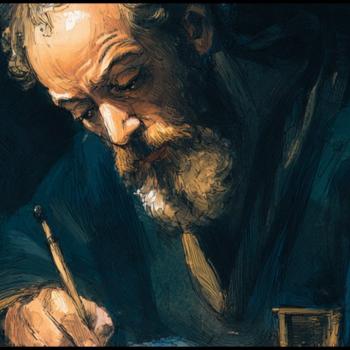This saying takes some work to unravel. First of all, because the second word in the saying –kind – may or not be an accurate descriptor of the man who owned the vineyard in question.
Here’s how some scholars explain it:
“…what does this ancient Christian parable mean? Its interpretation is complicated by a troublesome lacuna, or hole in the papyrus, in its very first line. The missing word is an adjective which would have modified the word ‘person’ in some way. The extant letters around the edges of the hole permit a reconstruction of the word ‘good,’ so that one could speak here of a ‘good person’ who rented the farm to ‘evil’ tenants, just as one finds in the synoptic versions of the story. But the extant letters also permit the reconstruction of the word for ‘creditor’ or ‘usurer,’ which would make this person one of the absentee landlords so much hated among the land-poor peasants of Galilee. One wonders, in the rural areas of Palestine and Syria among the dispossessed and poor – the tenant class – how this parable would have been heard. Were these evil tenants, or were they brave tenants?” (Q-Thomas Reader, p. 102, John S. Kloppenborg, Marvin W. Meyer, Stephen J. Patterson, and Michael G. Steinhauser)
So, without knowing for certain whether the qualifier here for the landowner is “good” or “usurer”, the rest of it is difficult to explain.
What we do know is that, if this saying was one of the original sayings of Jesus in the earliest form of Thomas, then it’s quite likely that the point of the parable is that those who seek to own property, or exploit workers for their own financial gain, are blind to the ultimate reality of Oneness and connection. They fail to see the workers as themselves, or to recognize that the land and the fruit that grows on it belong to everyone, everywhere.
If that is the case – and it would have to be for it to make sense alongside every other saying of Jesus in this Gospel – then the point is not that the landowner is evil or the tenants are good, or vice versa. Instead, the wisdom for us to glean from this saying is not to get caught up in the illusion of separation which can only lead us to either lose our sons and daughters to greedy tenants, or to become murderers who kill in order to keep the fruit and the property for ourselves.
Both the landowner and the tenants are deluded by the illusion of “us/them” and “yours/mine” and they both end up doing the wrong thing, and suffering the consequences for their blindness.
Anything that leads us to become enchanted by the notion that we are separate from one another, or from God, is something we need to actively guard ourselves against, because, as this parable illustrates, it only leads to violence and suffering.
Those who have ears to hear should listen.
**

Curious about the life and work of science fiction author Philip K. Dick? If so, you might want to join us for a new self-paced online course starting August 7th – The Gospel of Philip K. Dick – which is led by author and theologian, Keith Giles.
This course will cover Philip K. Dick’s major themes – “What is reality?, What makes us Human?, and How do we know what’s real?” – as found in his major novels – Do Androids Dream of Electric Sheep?, Flow My Tears The Policeman Said, UBIK and VALIS.
We’ll also talk about the author’s personal life and his obsession with Valentinian Gnosticism, the illusion of separation, and Quantum Physics.
LEARN MORE AND REGISTER HERE>
**
Keith Giles is the best-selling author of the Jesus Un series. He has appeared on CNN, USA Today, BuzzFeed, and John Fugelsang’s “Tell Me Everything.” He hosts the Second Cup with Keith podcast, and co-hosts the Apostates Anonymous podcast, and the Heretic Happy Hour Podcast. Find out more about his online courses HERE>















